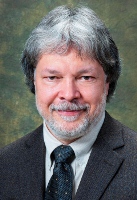
Philip Pellett, Ph.D., professor of Immunology and Microbiology for the Wayne State University School of Medicine, has been appointed interim chair of the Department of Immunology and Microbiology, effective Oct. 1.
Jack D. Sobel, M.D., dean of the School of Medicine, announced the appointment Sept. 30.
"I look forward to the challenges of ensuring that the School of Medicine continues to provide high-quality education for medical and graduate students in the disciplines of immunology and microbiology, which are intertwined with many aspects of modern biomedicine," Dr. Pellett said. "We will build on past successes of our department as we develop new research and education programs that will address critical needs in the local and in the global community and foster development of the next generation of physicians and scientists."
Dr. Pellett, of Grosse Ile, Mich., replaces Paul Montgomery, Ph.D., who is stepping down to concentrate on research. Dr. Montgomery is one of the longest-serving chairs of Immunology and Microbiology in the country, and one of the longest-serving department chairs at Wayne State University.
Dr. Pellett, a widely published and respected researcher, joined the School of Medicine faculty in 2007. He received his bachelor's degree in chemistry in 1980 from Ohio University and his doctoral degree in virology from the University of Chicago in 1986, working in the laboratory of Bernard Roizman, Sc.D.
He served as chief of the Herpesvirus Section of the U.S. Centers for Disease Control and Prevention from 1986 until 2003. He directed Herpesvirus Translational and Basic Research at the Cleveland Clinic from 2003 to 2007. He served as a professor of Molecular Biology and Microbiology at Case Western Reserve University, and as a professor of Molecular Medicine for the Cleveland Clinic Lerner College of Medicine at Caser Western Reserve University.
Dr. Pellett has been an advisor and consultant to the National Institutes of Health, the U.S. Food and Drug Administration, the National Science Foundation, the director of the National Cancer Institute and the Human Herpesvirus 6 Foundation. He chaired the Herpesvirus Study Group of the Vertebrate Virus Subcommittee of the International Committee for Taxonomy of Viruses from 2006 to 2009. He is an associate editor of the Journal of Medical Virology, and serves on the editorial boards of several virology and immunology journals, including Journal of Virology. He has been invited to write numerous editorial commentaries and is responsible for chapters about herpesviruses in highly regarded reference texts, including the "Manual of Clinical Microbiology" and "Fields Virology."
His research focuses on understanding the biology of human herpesviruses and improving clinical outcomes of infection. He studies how human cytomegalovirus remodels cells it infects, transforming them into factories that can produce an infectious virus. Cytomegalovirus, or CMV, is the leading cause of congenitally-acquired cerebral palsy and deafness, and an important cause of mental retardation, seizures, blindness and death. One in 150 children is born with the virus, and one in 750 is born with or will develop permanent disabilities caused by congenital CMV.